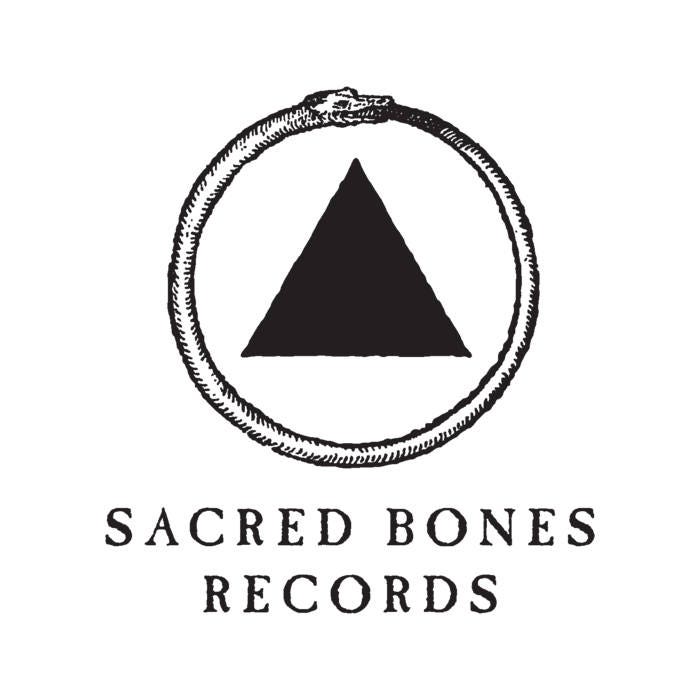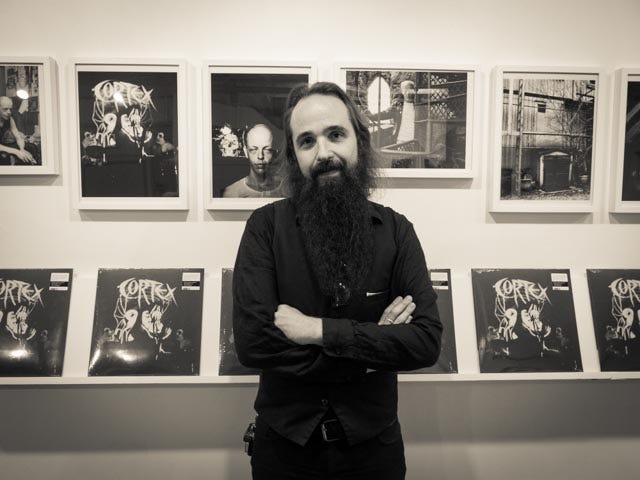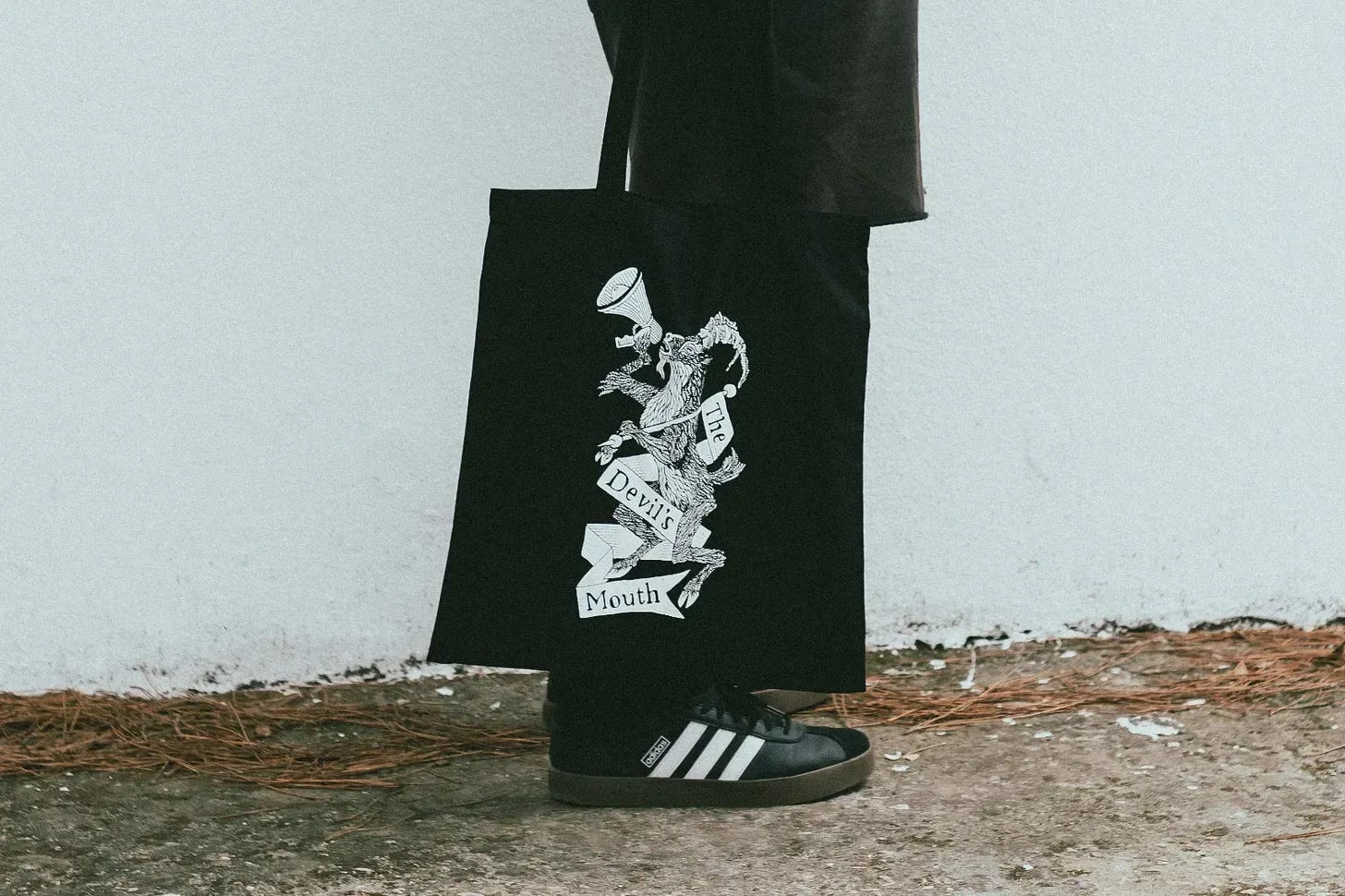LABEL SPOTLIGHT: Sacred Bones Records
Founded in 2007, Sacred Bones have steadily built a mightily impressive catalogue, all without ever thinking of genres. We talked to founder/owner Caleb Braaten about the kind of vibe he looks for.
Visit Mondo Negro now for an exclusive discount on all Sacred Bones Records releases!
Listen to our exclusive -Mondo Negro vs. The Devil’s Mouth- Sacred Bones playlist while reading:
As seems to be the case with pretty much all the coolest record labels, even the ones that became huge, the beginning of Sacred Bones Records was not really the stuff of legends, and not much of a big story at all, just something someone did for fun once without really thinking about it. Guy works at a record store, friend asks help to release a single, guy does it himself, it goes well, roll that snowball almost two decades into the future and you got a label that has worked with the likes of David Lynch, Moon Duo, Boy Harsher, Boris, Khanate, Föllakzoid, Zola Jesus, Pharmakon or Thou, among so many others.
One thing that Caleb tells us in the wonderful chat he had with us that you can read in its entirety right after the jump does stand out, and also seems to be a distinct mark of some of the most exciting, not to mention successful, independent labels operating at the moment - not only he affirms the genreless approach of the whole endeavour, he actually calls it “specifically genreless”, which unless you’re operating out of sheer passion on a small niche and really want to keep it that way - and that’s cool, there’s space for all kinds of approaches and operation sizes, as far as I’m concerned - seems to be the “good” way of going about it, especially in this day and age of scattered attention and ever-shifting, more than usual, musical landscapes. Caleb also offers another very important piece of wisdom when he says “you keep connected with the kids so you can teach them about what happened in the past,” again encapsulating the way Sacred Bones has been able to keep with the times and sign new and upcoming exciting youngsters while also keeping the past alive through some quality reissues of people like Townes Van Zandt or Blaze Foley among others.
As always, don’t forget to check out our friends at Mondo Negro for an exclusive temporary discount on all things Sacred Bones.
Ladies and gentlemen, we now give the word to Mr. Caleb Braaten.
Let’s start the usual way, at the beginning. How did Sacred Bones start?
Caleb Braaten: We started very small, it was just intended as a hobby. I was doing a merch company, I was making bootleg horror movie t-shirts and patches and that kind of thing, showing up at conventions and selling them with a friend of mine, just for fun. It was really just something fun to do at the weekends. We did that for a few years, we had a website and a pretty good amount of people would follow us and buy our stuff. At the same time I was working at a record store – I worked at record stores for, I don’t know, a very long time, twenty years or something. So I was working a record store in Williamsburg called Academy Records, with a bunch of friends of mine there, who were really into the music scene and stuff. Another friend of mine who I worked with at the bar that I also worked at – I worked a lot of jobs, I did a lot of stuff – had a band that I really loved and he was asking me to advice on who to ask to put out a 7”, a single for their new record. And I told him I didn’t know, but that I could probably figure out how to do it. I had this little company, the webstore, a small following… I knew people in record stores, I could definitely get it in a handful of stores, so I thought I could definitely be able to sell him at least a few hundred copies of it. And that’s it, that’s how it started!
I guess it helped that you were already immersed in the music business, so to speak.
Caleb: Yeah, my friends that I worked with at Academy were very encouraging and also started their own record labels, most notably Mike Sniper who started Captured Tracks as well, so we kind of started all together there. Everyone was helping each other out. Then it just grew from there. It was basically a community of people working out of the basement of a record store just helping each other out, and whatever, here we are twenty years or so later, it’s my full-time job, and it became a real thing.
When did it start to feel serious?
Caleb: Probably a few years in. There was a time when Zola Jesus was really starting to take off in a way, and I thought, yeah, maybe this will be a thing. But listen, I didn’t quit bartending until 2020, so. I’d probably still work there if the bar didn’t close during the pandemic. [laughs]
It was more like bartending kinda quit you.
Caleb: Yeah, more like it. [laughs] It was kind of silly. I would be working my happy hour shift and I’d be getting calls from managers and I had to pretend I wasn’t bartending. It felt so weird, the label owner is also a bartender, what? I don’t know. I remember Nine Inch Nails’ manager called once, and I was pretending to be all professional and it was just silly.
“Hello, Sacred Bones office,” while bottles were clinking around you?
Caleb: Something like that, yeah. [laughs]
Have you ever defined the kind of music you’d like to have on the label, in any way?Caleb: No… If anything, it’s specifically genreless. In my mind, there is no genre. And I know people will disagree with that, because things need to be put in boxes, which I understand because it’s easier for people, but in my mind, it’s not a genre-based record label.
What’s your criteria for considering or signing someone?
Caleb: It just needs to have soul. It’s impossible to define it exactly, but it has to be something I get really excited about. If I don’t really love it, there’s no point in doing it. It’s not just me, the staff too, because it’s a real team effort over here. If we’re all excited about something I take that as a good sign. Regardless of what genre it is. And I do realise the music tends to be on the darker side, yes.
I did a podcast with Justin Pearson a while ago talking about the same subject for his record label, and all he could come up with was “it’s a vibe,” but it still seems like the best description for it.
Caleb: Exactly. It’s too hard to pin it down, and it would be no fun to do it, either. To have like a bullet list, what you need to be a band. Nah, it just has to vibrate the right way.
Can you extract yourself from it though, if you see it’s worth it? Can you recognise something might be really cool, even if you’re really into it yourself?
Caleb: Oh, 100%. I saw Beyoncé some months ago, I went to her concert, and it’s not necessarily something that I’m into, I don’t know anything of her records and I don’t know if I’d ever put it on, but it’s good, man. That shit’s good. These people are working really hard and they’re hitting the marks, it was impressive.
Apart from Zola Jesus, which was kind of your first flagship artist and I think could be said grew together with the label, what would you say were some important earlier editions?
Caleb: Definitely the Blank Dogs record, which was the second record we put out. At the time, in the scheme of things, it would have been a small thing, but it was a huge thing for us because they became quite popular for a time. That record we did was so good. Again, Mike did that project and he started Captured Tracks and we did all that stuff together. But that definitely got some eyes on the label, for sure, and very early on. Then, not a specific record, but I think maybe the template for the LP covers did a lot of work, too. It was by design, I wanted there to be a defining characteristic, aesthetically, when I started the label, and I think it worked. Then, so many… Moon Duo was a really good one too, a really big part of the label. David Lynch was a huge thing to do, also early-ish, it was a huge, huge moment for us.
Yeah, you’ve worked with people that are absolutely “universal”, like David Lynch or John Carpenter… Is it different to deal with those guys?
Caleb: You know, it’s not, not really. They’re just like anybody else. There can be a go-between, a manager or something that you do a lot of the nitty-gritty work with, but you know, they’re just like anyone else in the end. They’re available, they’re there, they’re putting in the work, and sometimes they’re actually working harder than a lot of other people. On a personal level, sometimes it’s easy to get starstruck, of course, especially being a lifelong fan of these people, when you get to hear these cool stories and you try and pretend you’re not a big fan, you know?
“Yeah, cool story David…”
Caleb: [laughs] Yeah, just like that. John is very easy to get to as well, he’s just out there doing the work.
“It’s too hard to pin it down, and it would be no fun to do it, either. To have like a bullet list, what you need to be a band. Nah, it just has to vibrate the right way.”
- Caleb Braaten
Do you still think of the label the same way these days, are you still looking to expand, are you still always in “discovery mode”?
Caleb: Of course. We keep signing new artists, we signed three new artists last year for example, and we’re always trying to broaden our horizons. It’s a tough call, how it happens it really a mix of looking and just keeping your mind open to new things. Very often things just fall in your lap too. Sometimes it’s hard to keep connected though. There is some work to be done to try and understand what’s happening, especially as new generations start making music that isn’t easily as connected to what you’re used to. That’s a hurdle of doing this for a long time, I get older and the label gets older, but the real excitement in music is still with the kids. And it’s hard to sometimes connect with what’s happening with youth culture when you’re not part of it.
I’m curious about Këkht Ärakh, for example. How did you get to it?
Caleb: I believe he was recommended to me by a friend of mine, who knows a lot about what’s happening in the black metal underground and that kind of dungeon synth stuff and all kinds of strange corners of music. I think that he was talking to Dima, who does the project, and Dima asked if he knew me, that’s how we got in touch. Honestly I hadn’t heard the record yet, and when I did, I thought it was so cool. It’s so good!
You are also on a very commendable mission to keep some “oldies” alive too, I particularly liked your reissues of Townes and Blaze Foley for example.
Caleb: Yeah, totally! You keep connected with the kids so you can teach them about what happened in the past. It’s basically the same thing that Këkht Ärakh’s doing. It’s all connected, in my mind.
Have you had any kind of disappointments throughout the years?
Caleb: I would say that there hasn’t been much drama in the way of interpersonal stuff, but sure, there’s been plenty of disappointments. I would say that every record we’ve ever put out should have done better, more people should have heard it, and it’s better than anyone thinks that it is.
So in that sense, everything is a disappointment.
Caleb: That’s life, bud. [laughs]
On the other hand, has there been stuff that took off in a way you didn’t expect?
Caleb: Sure, there’s that too. Molchat Doma is a great example of band that started taking off seemingly out of nowhere. I just thought the records were unbelievably good and the band was so cool and then all of a sudden it became a thing on social media, and they went viral or whatever. That was amazing, and it’s so cool to see them be able to take this moment and really run with it. It has translated into amazing live shows, they have so many fans… I mean, it’s a post-punk band singing in Russian, they get thousands of people singing along and there’s no way they all know what they’re singing. But still, more people should listen to them! [laughs]
“I would say that every record we’ve ever put out should have done better, more people should have heard it, and it’s better than anyone thinks that it is.”
- Caleb Braaten
You already founded the label during the internet age, but has the increasing complexity and reach of social media brought added difficulties to the job?
Caleb: Yeah, it’s most certainly more difficult than it ever was. There’s constantly a new thing that we need to do. It’s like, okay, now we need to figure out a way to engage in TikTok, but none of the old things have gone away. It’s not like there’s a “new way”, it’s all things that you keep having to do, exponentially, and it becomes very time-consuming. There’s various streaming services, and they all demand more from the artists or the label… it seems neverending.
Is that part of the reason you have assembled a team around you as the years went by?
Caleb: Yeah, you have to, it’s the only way to continue to exist. I’ve had friends who just couldn’t figure out a way to get help, and it doesn’t work at all. You can’t do it all by yourself, absolutely not.
One of the most exciting things to happen at Sacred Bones in the last couple of years was surely the return of Khanate. How was dealing with those dudes?
Caleb: I love those guys! They’re so cool. I’ve been friends with O’Malley for a little while, so it was really exciting to get to work on a project with him finally. Randall Dunn who produced the record is also a frequent collaborator and has worked on a lot of stuff we’ve done, and I also knew Plotkin from his mastering stuff, he’s mastered a lot of things for us. The other guys I didn’t know before so it’s great to get to work with them. They’re such legends, and the bleakest in the business!
Do you see yourself doing this in ten years?
Caleb: I don’t know what the hell else I would do! [laughs]
You can find Sacred Bones Records on Instagram, Facebook, Bandcamp and Spotify.
Visit Mondo Negro now for an exclusive discount on all Sacred Bones Records releases!
Want an exclusive tote bag? Become an ANNUAL subscriber of TDM and we’ll send you one, free postage worldwide.











